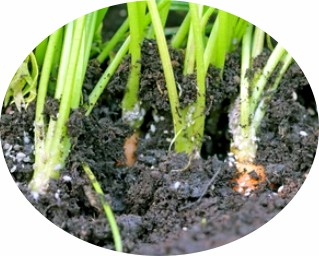With the modernization of agriculture, agricultural production patterns characterized by high inputs and outputs, monoculture, high replanting index, and heavy fertilization and dosing, the promotion and development of this pattern has led to extensive degradation of agricultural soils and the frequent occurrence of soil-borne diseases, which has made soil-borne diseases a global problem. Lifeasible is committed to the forefront of agricultural research technology, we continue to provide advanced and reliable technological solutions to the challenges of agricultural development and provide reliable solutions for the control of soil-borne diseases, we aim to utilize inter-root microorganisms in the control of soil-borne diseases.

Soil-borne diseases are extremely common worldwide, such as wilt, standing wilt, yellow wilt, root rot, etc. These diseases bring significant economic losses to agricultural production and seriously constrain the sustainable development of efficient agriculture.
Soil-borne diseases are mainly caused by plant-pathogenic microorganisms in the soil, and common soil-borne pathogenic microorganisms include Fusarium oxysporum, Rhizoctonia solani, Verticillium dahliae, etc.
Soilborne pathogenic microorganisms survey has a vital role in the prevention and control of soilborne diseases, especially for hot spots and sensitive crops; regular surveys should be conducted to find out the number of soilborne pathogenic microorganisms and their activity patterns to prevent them in advance and to avoid the occurrence of large-scale outbreaks of soilborne diseases in crops. We have established an advanced molecular biology technology platform that utilizes a variety of emerging assays, including fluorescence quantitative PCR and other techniques, which are widely used for soil pathogen population analysis due to their high sensitivity and reproducibility and short analytical time-consumption. In addition, we can design specific probes for major pathogens and make gene chips to simultaneously detect multiple pathogen populations in multiple soil samples within a short period.
Rapid and accurate determination of soilborne pathogenic microorganisms is of great significance for controlling soilborne diseases. Molecular biology techniques play an essential role in detecting soil-borne pathogenic microorganisms, among which the qPCR technique is widely used because of its high sensitivity and specificity. By designing specific primers for particular pathogenic microorganisms, we can quantify the target microorganisms in soil samples in a short time with a low detection limit, which enables us to detect pathogenic microorganisms at very low concentrations. In addition, the loop-mediated isothermal amplification (LAMP) technique is also an effective means for the rapid detection of soil-borne pathogenic microorganisms, and this technique is characterized by easy operation, fast detection speed, and high sensitivity, which is suitable for rapid detection of large-scale samples in the field. In addition, we can also combine other technologies, such as high-throughput sequencing and gene chips, to improve the accuracy and efficiency of detection.
In the control of soil-borne diseases, we continue to strengthen the application of high-throughput sequencing technology, macro-genomics, and bioinformatics, and at the same time, research and explore more effective strain isolation and cultivation technology and improve the bactericidal efficiency of biocontrol bacteria based on synergistic effects of bacterial flora in production practice, to provide technical support for the correct use of inter-root microorganisms to promote plant nutrient uptake, resistance to soil-borne diseases, adaptation to environmental stress, and promotion of the sustainable development of agriculture.
 Fig.2 Our service advantages. (Lifeasible)
Fig.2 Our service advantages. (Lifeasible)
Lifeasible utilizes inter-root microorganisms to provide a reliable solution for soil-borne disease control, and our service provides important technical support in promoting plant nutrient uptake, resisting soil-borne diseases, adapting to environmental stresses, and promoting sustainable agriculture. If you are interested, please feel free to contact us.
Lifeasible has established a one-stop service platform for plants. In addition to obtaining customized solutions for plant genetic engineering, customers can also conduct follow-up analysis and research on plants through our analysis platform. The analytical services we provide include but are not limited to the following:
Get Latest Lifeasible News and Updates Directly to Your Inbox
Adaptive Evolutionary Mechanism of Plants
February 28, 2025
Unraveling Cotton Development: Insights from Multi-Omics Studies
February 27, 2025